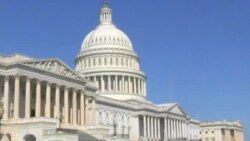CAPITOL HILL —
As President Barack Obama prepares to unveil reforms to the National Security Agency and other intelligence agencies, some lawmakers are already calling on Congress to act to protect the privacy and civil liberties of those whose phone and e-mail records are being collected. The president is expected to turn to Congress to help establish limits on government surveillance.
Former National Security Agency contractor Edward Snowden revealed the sweeping nature of U.S. programs to collect billions of phone records of Americans and to spy on some U.S. allies overseas, including German Chancellor Angela Merkel.
An unusual coalition of liberal Democrats and libertarian Republican lawmakers are demanding policy changes - to restore confidence at home and abroad. Republican
“I do think it has done damage to the United States abroad," said Representative Cynthia Lummis. "I would like to see a more rational basis for collecting that kind of data."
Lummis is co-sponsor of a House bill that would require U.S. intelligence agencies to notify Congress of their total budgets for intelligence gathering each year. She says more transparency is needed.
“Not to their methods, and not to details, but rather why Americans’ personal information is being retained for five years, why it is necessary that every American have that information trapped in a database," she said.
Some lawmakers have concluded that the massive phone records program is not valuable enough to national security to justify the intrusion on American’s privacy.
“We are really having a debate about Americans’ fundamental relationship with their own government," said Democratic Senator Patrick Leahy. "The government exists for Americans, not the other way around."
Other lawmakers defend the programs and reject calls for major changes by a panel of experts.
“Some of the recommendations in the report appear to make it more difficult to investigate a terrorist than a common criminal," said Republican Senator Chuck Grassley.
Other lawmakers expressed concern that some terrorist attacks have suceeded - including the Boston marathon bombing last year - despite the massive surveillance.
Republican Senator Ted Cruz said he thinks many Americans would prefer more scrutiny on what he called "bad guys."
“People that we have reason to suspect may be planning a terrorist attack, and far more protection for law-abiding citizens who have committed no transgressions," he said.
Privacy advocates say Congress needs to take responsibility for reining in surveillance.
“Congress is the place that we have democratic debates about what the right balance ought to be between security and liberty," said Leslie Harris, president of the Center for Democracy and Technology. "And to be honest, since 9/11, it has been very difficult to have those debates."
Analysts say President Obama will turn to Congress to help craft reforms that will satisfy the demands of privacy advocates, U.S. allies and national security concerns.
Former National Security Agency contractor Edward Snowden revealed the sweeping nature of U.S. programs to collect billions of phone records of Americans and to spy on some U.S. allies overseas, including German Chancellor Angela Merkel.
An unusual coalition of liberal Democrats and libertarian Republican lawmakers are demanding policy changes - to restore confidence at home and abroad. Republican
“I do think it has done damage to the United States abroad," said Representative Cynthia Lummis. "I would like to see a more rational basis for collecting that kind of data."
Lummis is co-sponsor of a House bill that would require U.S. intelligence agencies to notify Congress of their total budgets for intelligence gathering each year. She says more transparency is needed.
“Not to their methods, and not to details, but rather why Americans’ personal information is being retained for five years, why it is necessary that every American have that information trapped in a database," she said.
Some lawmakers have concluded that the massive phone records program is not valuable enough to national security to justify the intrusion on American’s privacy.
“We are really having a debate about Americans’ fundamental relationship with their own government," said Democratic Senator Patrick Leahy. "The government exists for Americans, not the other way around."
Other lawmakers defend the programs and reject calls for major changes by a panel of experts.
“Some of the recommendations in the report appear to make it more difficult to investigate a terrorist than a common criminal," said Republican Senator Chuck Grassley.
Other lawmakers expressed concern that some terrorist attacks have suceeded - including the Boston marathon bombing last year - despite the massive surveillance.
Republican Senator Ted Cruz said he thinks many Americans would prefer more scrutiny on what he called "bad guys."
“People that we have reason to suspect may be planning a terrorist attack, and far more protection for law-abiding citizens who have committed no transgressions," he said.
Privacy advocates say Congress needs to take responsibility for reining in surveillance.
“Congress is the place that we have democratic debates about what the right balance ought to be between security and liberty," said Leslie Harris, president of the Center for Democracy and Technology. "And to be honest, since 9/11, it has been very difficult to have those debates."
Analysts say President Obama will turn to Congress to help craft reforms that will satisfy the demands of privacy advocates, U.S. allies and national security concerns.










